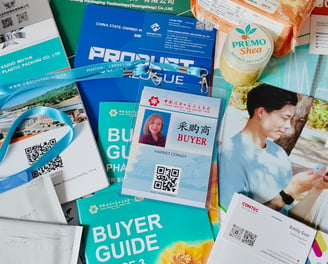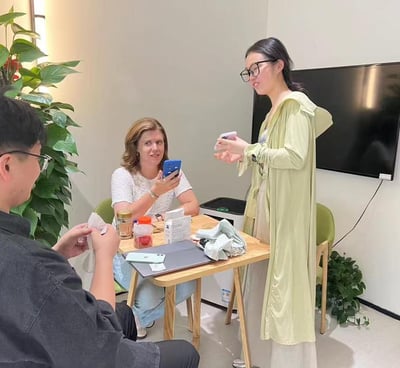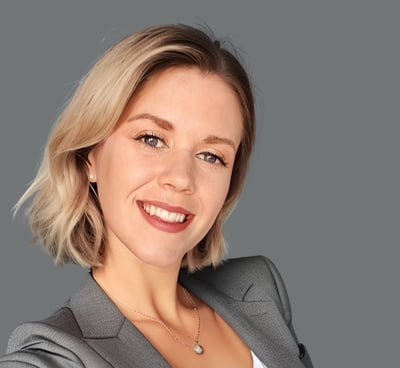In My Own Words: By the COO & Co-Founder of Hunan Premo Trading
An interview with Harriet Comley, Co-Founder & COO of Hunan Premo Trading Co., Ltd.
THE TEAM
Harriet Comley
5/4/202510 min read






In this candid interview, Harriet Comley — Co-Founder and COO of Hunan Premo Trading Co., Ltd. — reflects on her academic journey, unexpected path into trade, and the joys and challenges of building a business across continents. From navigating identity in postcolonial Africa to unpacking the deeper meaning of shipping containers, this conversation offers a glimpse into the mind of someone who’s all in — driven by purpose, curiosity, and a love of honest, human-centred work.
1. What did you study, and how did your academic background lead you to where you are now?
I have a BA in Geography from Lancaster University in the UK, with a year abroad at the University of Western Ontario in Canada. I later completed an MA in Environment, Culture & Society — also at Lancaster — and I’m currently pursuing a PhD in Sociology. Though, I’ll be honest, the PhD is on the backburner while Hunan Premo Trading Co., Ltd takes off.
I’ve always been fascinated by people, the environment, travel, and tourism. University was my happy place — I genuinely loved learning. I loved lectures. The highlight of my undergraduate degree was being hand-selected from my cohort to travel to the Brazilian Amazon rainforest on a conservation trip. It was one of those moments that quietly shifts your entire perspective.
Something I find quite funny is how many people — especially internationally — don’t really understand what “Geography” as a subject actually involves. A lot of people think it’s just capital cities and maps. But real geography incorporates history, politics, economics, law, environmental science — even philosophy. It’s about understanding how the world works in the deepest sense, from physical systems to human behavior.
Having originally wanted to become a lawyer, I’m so grateful for the moment I realised I needed to study what I was truly passionate about. Geography gave me a way to see the world that I still carry into everything I do — whether I’m analysing trade systems, understanding cultural nuance, or building cross-continental partnerships. That academic grounding helps me ask better questions, challenge assumptions, and design businesses that actually make sense in the real world.
2. Did you ever imagine trading cocoa, gold tailings, and shea butter would be in your future?
Of course the answer to this question is no. But I think there comes a point in your life where you start reflecting — on the decisions you’ve made, the small pivots along the way — and you realise that nothing really happened by chance. It might not have been “the plan,” but your actions led you here.
If I remember correctly, my mum once said, “Oh, you could do what your dad does.” I must have been quite young, and I scoffed at the idea of his 40–50 hour work week, sitting at a computer (unless he was off on some business trip). I thought: That’s not the life I want.
Ironically, my dad spent over 40 years in consultancy, international import and export — focusing primarily on Africa. And here I am, years later, in a strikingly similar line of work.
But even before then, the signs were already there. I wanted to be a professor — until I decided life was too short to sit still, and there was too much of this incredible planet I needed to see for myself. So I packed my bags and moved to Vietnam to teach English.
And during my Master’s degree, my thesis was titled “Orientalism, Othering & Colonialism: Tourism Literature and UK Attitudes towards Africa as a Tourist Continent.” An interest in Africa had clearly taken root long before I ever entered a boardroom.
So no — I didn’t imagine cocoa or gold tailings would be part of my story. But if I’d allowed myself a little more self-reflection, I might have seen that this path — with the right guidance and the right partnership (our CEO, Jim Supremo) — was always waiting for me. And truthfully, it feels like exactly what I was meant to be doing.
3. What would you consider is your favourite part of your new venture as Co-Founder and COO of Hunan Premo Trading Co., Ltd.?
Three things stand out to me immediately: freedom, variation, and creativity.
Co-founding a business feels—though in its own wild way—like raising a child. It’s something you shape, protect, grow with, and sometimes grow through. It demands attention and rewards devotion. I’ve always had a deep, obsessive love for the things that move me—whether it was tennis in my youth or the feeling of arriving in a place I’ve never been. When I love something, I give it everything. This is no different.
What this venture gives me—quietly, daily—is the freedom to work in a way that aligns with who I am. I’ve worked for others before. I know the frustration of giving energy to visions that aren’t mine. Now, every decision I make reflects a value I believe in.
No two days are the same. One moment I’m writing, the next I’m managing timelines, creating brand visuals, or structuring operations. And for my restless, curious mind—that’s everything. I don’t just want to work. I want to build, to shift, to try, to create. This business gives me that. And I give it everything in return.
4. Let’s talk Premo — what’s the hardest part of building something from the ground up?
Jim and I started this company from opposite sides of the world — I was visiting England, he was in China, and suddenly, the ideas wouldn’t stop coming.
Everything moved fast. Sometimes it’s hard to comprehend how much has happened in such a short space of time. I don’t know if that’s common in business — maybe in the beginning, the momentum just builds and the vision pours out. There’s so much to prepare, to organise, to imagine.
But if I had to name the hardest part of building something from the ground up? It’s doing it while working full-time elsewhere.
I wasn’t just working a 9 to 5 — I had side hustles in the evenings and on weekends too. It wasn’t time I lacked, but time that flows. I work best in long stretches, where I can sink into the creative current. But when you’re grabbing 30 minutes here and there, it’s like trying to write a novel in stolen sentences.
I’m writing this now on what’s technically a five-day vacation — though I use “vacation” loosely, because I’m working. But it’s Premo work. And that doesn’t feel like work. For the first time, I’m seeing how productive and alive I am when I can give this venture my full attention. I’m counting down the days until it becomes my full-time reality.
As of now, I don’t face many difficulties when it comes to building the business itself — because the concept is solid, and Jim and I make a great team. His strengths balance out my inexperience, and my areas of expertise complement his needs. It’s rare to find that kind of synergy, and it makes even the tough days feel purposeful. We both care deeply about what we’re creating, and that mutual respect and clarity of vision makes the foundation incredibly strong.
Something I don’t hear talked about enough is the mental divide — when you’ve already emotionally and creatively left a job, but your body still shows up for it. I give 100% to anything I do, always. But in truth, my heart and my mind crave something more. I long to give all of myself — my ideas, my energy, my time — to building the Premo brand. Not in the margins of my life, but in the centre of it.
5. You talk a lot about “honest trade” and “win-win.” Where does that belief come from?
Honestly? It comes from the fact that I’m a good person. And I know that might sound laughable to some business minds — like being decent somehow makes you soft or naïve. But I see it differently. There are already enough spaces in this world where people tear each other down. Business doesn’t need to be another one.
For me — and for our team — the real opportunity in Africa lies in lifting each other up, not climbing over one another. That’s something we’re passionate about promoting on a broader scale. Why aren’t African countries making it easier to trade with one another? Why isn’t free movement between African states the norm?
Too often, business is framed as “I win, you lose.” But in reality, those scenarios can just as easily lead to you both losing. A win-win approach, however, builds real relationships — the kind that last beyond the deal, and benefit everyone involved.
I also think the era of corporate greed at the expense of people has run its course. It’s obscene that some people are choosing between which yacht to take out this weekend, while others are wondering where their next meal is coming from. That kind of imbalance is not just unfair — it’s unsustainable.
So yes — I believe in honest trade, in partnerships built on fairness and transparency. Because at the end of the day, good business isn’t just about margins. It’s about impact. And if we do it right, we all get to move forward.
6. As someone who lives and works in China, what’s your perspective on the country — both personally and professionally?
I believe in education — it’s the only real way people grow. And honestly, if I could magically transport every person who makes a misinformed or negative comment about life in China online and let them live here for a while, I would.
I’ve long lost track of how China is portrayed in Western media, but I can tell you this: it doesn’t reflect the reality I experience.
Sure, like any country, China has its complexities. But the convenience of daily life here is undeniable. Almost instant delivery services, fast trains, cashless everything — your whole life exists at the click of a screen. Live here long enough, and going back to your home country can feel jarring, even inefficient — cough cough, London.
That level of efficiency frees you up to enjoy the other parts of life — travel, community, exploration. There’s so much to see and do if you know where to look. I find travelling during national holidays a bit hectic, but there’s no denying China’s geographic beauty.
Professionally, it’s a bit of a mixed bag. I’ve found the trade and business environment here to be extremely efficient and open to innovation — no complaints on that front. Working in education, however, was more nuanced. One thing I observed was a clear cultural difference in how creativity is approached. Many foreigners — myself included — come from education systems that encourage open-ended thinking, debate, and individual expression. In contrast, China’s academic model has traditionally focused on repetition, precision, and mastery through practice.
That doesn’t mean there’s no creativity in China — far from it. But the pathways to it are different. Creative confidence isn’t always nurtured in the same way, and in team settings, you can feel that gap. It’s something I had to navigate a lot as a teacher and curriculum designer.
But when you recognise these differences for what they are — structural, not personal — you learn how to bridge them. And when you align yourself with the right people, collaboration becomes not only possible, but powerful.
Overall, China has challenged me, surprised me, and helped me grow. And that’s all I could ask for.
7. As a British woman working across African markets — how do you navigate the legacy of colonialism while building trust in postcolonial environments?
It’s a balance — and not always an easy one. I’ve never felt particularly patriotic. Even as a teenager, I struggled to understand how people could feel proud of being British without reckoning with the full weight of that history. To be proud of where you’re from is, in many ways, to be proud of what that place has done. And when you’re talking about a country with a colonial past, that gets complicated fast.
I was lucky — I took an interest in history, geography, and sociology from an early age. My father often told stories of doing business in Africa, not aid. That mattered. Even if I didn’t know it at the time. It shaped the way I saw the continent: not as a charity case, but as a place of power and potential.
Throughout my adult life, I’ve been surrounded by Africans — in my personal life, my business life, and now within my company. My partner is African. Our team is African. I’ve even lived in Zambia for three years, which gave me an entirely new understanding of pace, systems, and daily life on the continent. That proximity has been humbling. I don’t speak for Africans — I listen, I work alongside, and I try to build platforms where their insight leads the strategy.
It’s also complex, because even now, I sometimes meet people who are proud to meet a Brit. That always feels uncomfortable to me. I carry the shame of what Britain did — and continues to do — in many parts of the world. But I also believe shame alone isn’t useful. What matters is what you do with it.
At Hunan Premo Trading, our entire approach is based on mutual respect, honest trade, and long-term cooperation. We want to create a win-win culture — one where African producers, Chinese manufacturers, and international partners all benefit fairly and sustainably. That means building relationships rooted in transparency, not extraction; collaboration, not control. It’s about creating systems that reward trust, consistency, and shared growth.
I don’t enter African markets as a saviour. I enter with skills, humility, and a willingness to learn. I believe non-Africans absolutely can — and should — speak up when they see injustice. But we should never center ourselves in those conversations. We follow the lead of those whose land, culture, and history we’re working within.
For me, the goal is always to use my position to open doors, not take up space. That’s how I try to navigate the legacy — not by pretending it isn’t there, but by acknowledging it and doing better in real, grounded ways.
8. What is your favourite random object?
A shipping container. For so many reasons.
First of all, when they’re all stacked together on those enormous ships, they actually look beautiful — like your game of Tetris glitched and gave you nothing but perfect rectangles. There’s something strangely satisfying about that kind of accidental order.
But beyond aesthetics, shipping containers mean something. They’re more than just big metal boxes. To me, they symbolise globalisation — quiet carriers of trade, connection, and complexity. Each one has a story. They could’ve come from any country, heading to any other, holding anything from cocoa beans to computer parts. They represent both the magic and the mess of modern consumerism — the way the world moves, buys, and builds.
And practically? I love how containers get repurposed. Some of the best DIY homes I’ve seen have been made from renovated shipping containers. And in Zambia, where I lived for three years, I loved how people would turn them into shops. There was something brilliant about it — resourceful, functional, and full of character.
So yes. Not the flashiest answer. But definitely the most me.
And if you made it all the way here — congratulations. You now know more about me than some of my family members. I’d say that deserves a medal… or at least a very strong coffee. ☕️
Thanks for reading — truly.
